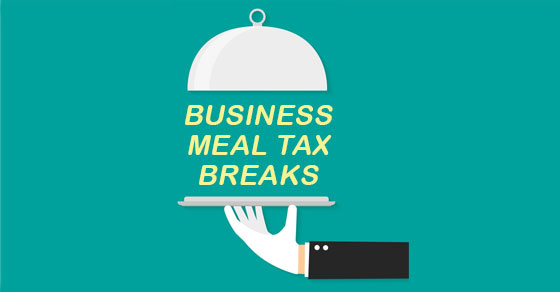A nonworking spouse can still have an IRA
- ByPolk & Associates
- Jun, 05, 2020
- All News & Information
- Comments Off on A nonworking spouse can still have an IRA
It’s often hard for married couples to save for retirement when one spouse doesn’t work. An IRA contribution is generally only allowed if you have compensation. However, an exception exists. A spousal IRA allows a contribution to be made for a nonworking spouse. Under the rules, a couple can contribute $6,000 to an IRA for a nonworking spouse in 2020 ($7,000 if the spouse will be age 50 by the end of the year). However, if in 2020, the working spouse is an active participant in an employer retirement plan, a deductible contribution can be made to the IRA of the non-participant spouse only if the couple’s adjusted gross income doesn’t exceed a certain threshold. Contact us for more details.
Business meal deductions: The current rules amid proposed changes
- ByPolk & Associates
- Jun, 05, 2020
- All News & Information
- Comments Off on Business meal deductions: The current rules amid proposed changes
One tax break that President Trump has proposed to help restaurants and entertainment venues is an increase in business meal and entertainment deductions. We’ll let you know if a law passes that enhances deductions. In the meantime, let’s review the rules. Before the pandemic hit, many businesses spent money “wining and dining” customers, employees and others. Under current law, entertainment expenses aren’t deductible. However, you can deduct 50% of the cost of business-related food and beverages, if you meet certain requirements. If you buy food and beverages at an entertainment event, you can deduct 50% of the cost, but only if business was conducted right before, during or afterwards.
Businesses revise sales compensation models during pandemic
- ByPolk & Associates
- May, 29, 2020
- All News & Information
- Comments Off on Businesses revise sales compensation models during pandemic
Because of the novel coronavirus (COVID-19) pandemic, many businesses are revising their sales compensation models. Nonprofit researchers WorldatWork released a report in late April indicating that 36% of organizations have begun addressing sales compensation in light of the crisis while another 49% are developing plans to do so. Three of the most common actions being taken are: 1) adjusting sales quotas to provide relief to salespeople who find themselves in a reluctant buying environment, 2) modifying wider performance measures such as average deal size and conversion rate, and 3) lowering plan thresholds that qualify sales staffers for specified payouts. Contact us for help.
Student loan interest: Can you deduct it on your tax return?
- ByPolk & Associates
- May, 29, 2020
- All News & Information
- Comments Off on Student loan interest: Can you deduct it on your tax return?
Many taxpayers with student loans have been hard hit by the economic impact of COVID-19. The CARES Act contains some help. It allows borrowers with federal student loans to stop making monthly payments until Sept. 30, 2020. If you do make student loan payments, you may be able to deduct the interest on your tax return, depending on your income and subject to certain requirements. The maximum amount of student loan interest you can deduct each year is $2,500. For 2020, the deduction is phased out for married taxpayers filing jointly with adjusted gross income (AGI) between $140,000-$170,000 ($70,000-$85,000 for single filers). The deduction is unavailable for taxpayers with AGIs above that.
IRS releases 2021 amounts for Health Savings Accounts
- ByPolk & Associates
- May, 29, 2020
- All News & Information
- Comments Off on IRS releases 2021 amounts for Health Savings Accounts
The IRS recently released the 2021 inflation-adjusted amounts for Health Savings Accounts (HSAs). For calendar year 2021, the annual contribution limitation for an individual with self-only coverage under a HDHP is $3,600. For an individual with family coverage, the amount is $7,200. This is up from $3,550 and $7,100, respectively, for 2020. For calendar year 2021, an HDHP is a health plan with an annual deductible that isn’t less than $1,400 for self-only coverage or $2,800 for family coverage. In addition, annual out-of-pocket expenses (deductibles, co-payments, and other amounts, but not premiums) can’t exceed $7,000 for self-only coverage or $14,000 for family coverage.
Attuning your social media strategy to the pandemic
- ByPolk & Associates
- May, 21, 2020
- All News & Information, COVID-19 Resources
- Comments Off on Attuning your social media strategy to the pandemic
Social media was important for businesses before the novel coronavirus (COVID-19) pandemic. It’s now become essential to maintaining visibility, building goodwill and perhaps even generating a bit of revenue. But the social media strategy you deployed before the crisis may no longer be effective or appropriate. Start by reviewing your approach to social media so you can identify what adjustments may be necessary. Avoid hard-sell tactics; focus on being helpful and supportive. Customers value brand consistency, so you probably shouldn’t change the look and style of your posts. Seek out opportunities to positively engage with those who follow your accounts. Contact us for more info.
Fortunate enough to get a PPP loan? Forgiven expenses aren’t deductible
- ByPolk & Associates
- May, 21, 2020
- All News & Information, COVID-19 Resources
- Comments Off on Fortunate enough to get a PPP loan? Forgiven expenses aren’t deductible
The IRS has issued guidance clarifying that certain deductions aren’t allowed if a business has received a Paycheck Protection Program (PPP) loan. Specifically, an expense isn’t deductible if both: 1) the payment of the expense results in forgiveness of a loan made under the PPP, and 2) the income associated with the forgiveness is excluded from gross income under the Coronavirus Aid, Relief, and Economic Security (CARES) Act. IRS Notice 2020-32 states that “this treatment prevents a double tax benefit.” However, two members of Congress say they’re opposed to the IRS stand on this issue. They say they’ll seek legislation to make certain expenses deductible. Stay tuned.
Did you get an Economic Impact Payment that was less than you expected?
- ByPolk & Associates
- May, 21, 2020
- All News & Information, COVID-19 Resources
- Comments Off on Did you get an Economic Impact Payment that was less than you expected?
Did you get an Economic Impact Payment (EIP) that was less than you expected? The federal government is sending EIPs to help mitigate the effects of COVID-19. If you’re under a certain adjusted gross income (AGI) threshold, you’re generally eligible for the full $1,200 ($2,400 if married filing jointly). And if you have a “qualifying child,” you’re eligible for an additional $500. Some people have received EIPs for less than they were expecting because they make too much money to receive the full EIP. Others may think their children are eligible for a payment and they aren’t. Still others may have debts, such as past-due child support or garnishments from creditors, that reduced their EIPs.
How to succeed at virtual team building
- ByPolk & Associates
- May, 15, 2020
- All News & Information, COVID-19 Resources
- Comments Off on How to succeed at virtual team building
Thanks to affordable technology, more and more companies have been allowing employees to work remotely. And, with the onset of the pandemic, many businesses have had to mandate that employees work from home. As a result, virtual team building has become even more critical. Make sure every remote team develops and follows processes that produce results consistent with those generated on your physical premises. Also, reinforce that your expectations are the same whether an employee works remotely or on-site. You can help remote workers feel more connected by regularly holding Web-based meetings, as well as by holding meetings specifically geared toward team building. Contact us for more info.
There’s still time to make a deductible IRA contribution for 2019
- ByPolk & Associates
- May, 15, 2020
- All News & Information, COVID-19 Resources
- Comments Off on There’s still time to make a deductible IRA contribution for 2019
You still have time to make your 2019 traditional and Roth IRA contributions. The deadline is generally April 15 but because of the novel coronavirus (COVID-19) pandemic, the IRS extended the deadline until July 15, 2020. If you qualify, deductible contributions to traditional IRAs can lower your 2019 tax bill. Even nondeductible contributions can be beneficial because of tax-deferred growth. If you’re eligible, the 2019 contribution limit is $6,000 (plus $1,000 for those age 50 or older on Dec. 31, 2019). However, your deduction or contribution may be reduced or eliminated based on your income. Contact us to learn more about retirement saving in your situation.










